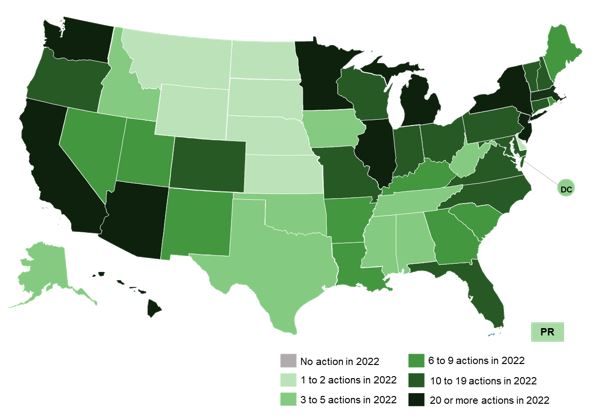Raleigh, NC – (February 8, 2023) The N.C. Clean Energy Technology Center (NCCETC) released its 2022 annual review and Q4 2022 update edition of The 50 States of Electric Vehicles. The quarterly series provides insights on state regulatory and legislative discussions and actions on electric vehicles and charging infrastructure.
The report finds that, for the second year in a row, all 50 states and DC and Puerto Rico took actions related to electric vehicles and charging infrastructure during 2022 (see figure below). The greatest number of actions related to rebate and grant programs, rate design, charging station deployment, and targets for state procurement of electric or zero-emission vehicles.
2022 State and Utility Action on Electric Vehicles

The report highlights ten of the top electric vehicle trends of 2022:
- States planning for the distribution of National Electric Vehicle Infrastructure (NEVI) program funding;
- Focusing on incentives over utility infrastructure deployment;
- Utilities proposing charging-as-a-service programs;
- Pursuing electric vehicle charging solutions at multi-unit dwellings;
- Utilities designing managed charging programs;
- Establishing statewide targets for zero-emission vehicle sales or adoption;
- Utilities exploring vehicle-to-grid capabilities through pilots;
- Policymakers addressing siting issues and HOA restrictions;
- Dedicating funding to transportation electrification for low-income customers; and
- Advancing deployment of electric school and transit buses.
“States filed plans with the federal government for their use of National Electric Vehicle Infrastructure, or NEVI, funding in September. The NEVI program was created by the bipartisan infrastructure law in 2021,” noted Rebekah de la Mora, Policy Analyst at NCCETC. “Funds will first go towards building out designated interstate alternative fuel corridors. The timeline between each state varies; some won’t have definitive plans for a few more years, while others are preparing to release RFPs in the near future.”
A total of 790 electric vehicle actions were taken during 2022. The report notes the top ten states taking the greatest number or most impactful actions in 2022 were California, Massachusetts, New York, Washington, North Carolina, Connecticut, Maryland, New Jersey, Arizona, and Colorado.
“Building off the NEVI plans they filed this year, states policymakers ratcheted up their EV policy activity in 2022,” observed Brian Lips, Senior Policy Project Manager at NCCETC. “In addition to very EV-specific activities, like new managed charging programs and incentives for charging equipment, a number of states also took steps to harmonize their EV planning activities with other utility planning activities.”
In Q4 2022, 38 states plus DC and Puerto Rico took some type of action on electric vehicles and charging infrastructure. A total of 361 actions were tracked in Q4.
View the 50 States of Electric Vehicles 2022 Annual Review and Q4 2022 Executive Summary
View and Purchase the 50 States of Electric Vehicles 2022 Annual Report and Q4 2022 update FULL Report
View other 50 States Reports – Solar, Grid Modernization and Electric Vehicles
ABOUT THE N.C. CLEAN ENERGY TECHNOLOGY CENTER
The N.C. Clean Energy Technology Center, as part of the College of Engineering at North Carolina State University, advances a sustainable energy economy by educating, demonstrating and providing support for clean energy technologies, practices and policies. It serves as a resource for innovative, sustainable energy technologies through technology demonstration, technical assistance, outreach and training. For more information about the Center, visit: http://www.nccleantech.
Media Contact: Shannon Helm, NCCETC, shannon_helm@ncsu.edu
